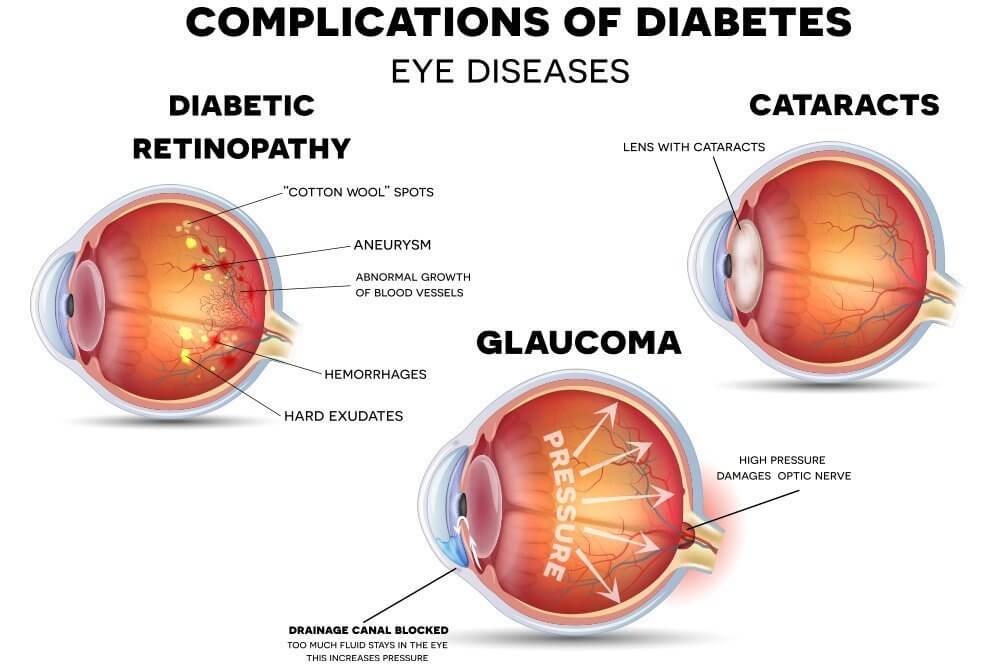Diabetic Eye Disease
Posted by: Invision Optometry in Category Diabetic Eye Care

Diabetic eye disease refers to a group of eye problems that affect those with diabetes. Those with diabetes may suffer from diabetic retinopathy, diabetic macular edema, glaucoma, and cataracts. Diabetic retinopathy is the most common cause of vision loss among those with diabetes, and it is also the leading cause of blindness. Diabetic eye disease can affect many parts of the eye, including the retina, macula lens and optic nerve. All forms of diabetic eye disease have the potential to cause severe vision loss and blindness, which is why getting an annual eye exam is so important. According to the International Diabetes Foundation, 1 in 10 people are living with diabetes. Yet, less than half of the adults with it recognize their risk factor for vision loss. Over time, diabetes can cause damage to your eyes. This happens when a person’s blood glucose, also called blood sugar, is too high (consistently). The good news is there are steps you can take to prevent diabetic eye disease, or keep it from getting worse. This should include a comprehensive eye exam, including dilation, every year.
According to the International Diabetes Foundation, 1 in 10 people are living with diabetes. Yet, less than half of the adults with it recognize their risk factor for vision loss.
Diabetic Retinopathy
Diabetic retinopathy is one of the leading causes of blindness. It occurs when blood vessels in the retina leak, swell, or close off completely, distorting vision. The retina is the light sensitive tissue that lines the back part of your eye that allows you to see fine detail. In the most advanced stage of diabetic retinopathy, new abnormal blood vessels grow on the surface of the retina, which can lead to scarring and cell loss. When damaged blood vessels leak fluid into the center of the retina, it results in a condition known as diabetic macular edema, which causes swelling in the central vision.
Most people with diabetes will develop some form of eye disease.
Diabetic Macular Edema
Diabetic macular edema is a complication of diabetes caused by fluid accumulation in the macula that can affect the fovea. The fluid makes the macula swell, blurring vision. Those who develop DME, already have diabetic retinopathy. Although it is more likely to occur as diabetic retinopathy progresses, it can occur at any stage of the disease.
Those with diabetes are 2-5 times more likely to develop cataracts.
Diabetes and Cataracts
Cataracts are the most common cause of vision loss in people over age 40, and the principal cause of blindness in the world. Anyone can get them, but people with diabetes tend to get them at an earlier age, and they get worse faster than those without diabetes. In fact, according to the National Eye Institute, those with diabetes are 2-5 times more likely to develop cataracts at an earlier age.
Having diabetes nearly doubles your chance of getting glaucoma.
Diabetes and Glaucoma
Glaucoma is a group of eye diseases that damage the eye’s optic nerve. This damage can lead to irreversible vision loss. Having diabetes nearly doubles your chance of getting glaucoma. Since eye complications are common with diabetes, it is very important that people with the disease get their eyes examined on a regular basis.
The good news is there are steps you can take to prevent diabetic eye disease, or keep it from getting worse. This should include a comprehensive eye exam, including dilation, every year.
Diabetic Eye Exam
Unfortunately, most people with diabetes will develop some form of eye disease. To keep your vision sharp, you’ll want to take great care of your health so you can avoid problems related to diabetes. To do this, schedule an annual dilated comprehensive eye exam with your eye doctor at least once a year. During the exam, your eye doctor will use special drops to widen (dilate) your pupils and check the blood vessels in your eyes for early signs of damage.
To keep your vision sharp, you’ll want to take great care of your health so you can avoid problems related to diabetes.
Diabetic Eye Care
Our eye doctors are experts at identifying and managing the potential visual threats caused by diabetes. If you have questions about our eye exams or need more information, call us today at (619) 222-2020.


